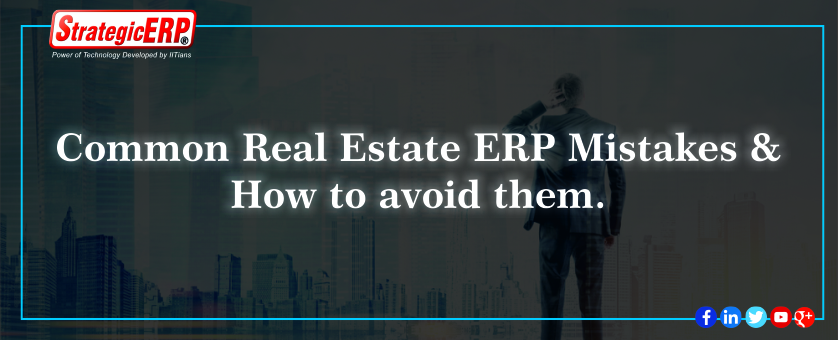Common Real Estate ERP Mistakes and How to Avoid Them
Category :
Blog posted by : Admin / 23 Aug, 2018
We have all heard many a times how an ERP solution is a game changer for the real estate business and has the power to improve bottom line, increase productivity and streamline workflow. In fact, in today’s fiercely competitive marketplace, ERP software is a must for real estate firms to stand out from the competitors. Having said that, implementing an ERP system is a complex process that requires careful planning, without which the project may fall flat. Given the complexity, there is a huge potential to make mistakes which can severely cost your organization. Good news is that these mistakes can be avoided by being aware of them and addressing them early.
To avoid potential costly errors, steer clear of these common mistakes while choosing, deploying or implementing an ERP for the real estate business:
Mistake 1: Letting only features guide your decision making: Whether your real estate ERP implementation will be a hit or miss will largely depend on your ERP partner. Don’t get carried away just by the features of the solution and be in the hurry to pick the one with the longest feature list. While features are definitely important, it is equally important to analyze the partner’s industry success rate, post go-live support and how it addresses the needs and requirements of your organization. Also, it is always prudent to pick an industry-specific solution. If you zero in on a specialized ERP solution targeted for the real estate business, you will benefit from customized modules and features. Finally, make sure that the partner you select has a strong top management, which believes in evolving the solution as per the advances in technology. Scalability of the solution is a must to stay competitive and derive optimal results.
Mistake 2: Not analyzing and communicating your priorities: Oftentimes, post go-live firms feel that they are not accruing the benefits they expected from their real estate ERP software. To avoid such a scenario, you must clearly evaluate your business and analyze your priorities. Discuss your primary goal of implementing ERP for real estate and clearly communicate your expectations to the provider. With ERP implementation, small steps always take you the long way. It is always a great idea to implement real estate ERP solution in a phased manner. Move the most business-critical processes, such as admin, sales, purchase, to name a few, in the initial phase. Focus on training, involving end users, taking their feedback and ensuring the solution works seamlessly across all devices right from desktop, mobile to tablet. Only once you have addressed all the glitches, should you move to the next set of critical applications.
Mistake 3: Setting unrealistic deadlines and underestimating the budget: Careful planning is at the core of the success of a real estate ERP solution. Stay away from doing the classic mistake of achieving more with less. Invest time in estimating the expenses, duration of the project and level of talent required to carry out the implementation. Near-accurate estimation will take you a long way. It will avoid unnecessary pressure, as well as any issues or surprises later. Make sure that your internal implementation team is strong and has the right skill sets to take the decisions to get the job done.
Mistake 4: Ignoring the maintenance plan: ERP systems are not implement and forget systems. A maintenance strategy is a must to make sure the real estate ERP software doesn’t become outdated or obsolete. Running outdated systems can lead to security issues, crashes and integration problems. Discuss with your provider and understand their plan to evolve with the latest technology and update the ERP system on a regular basis. Having a set maintenance plan for your real estate ERP solution will ensure that it remains up-to-date with the latest applications and is integral to its smooth running.








